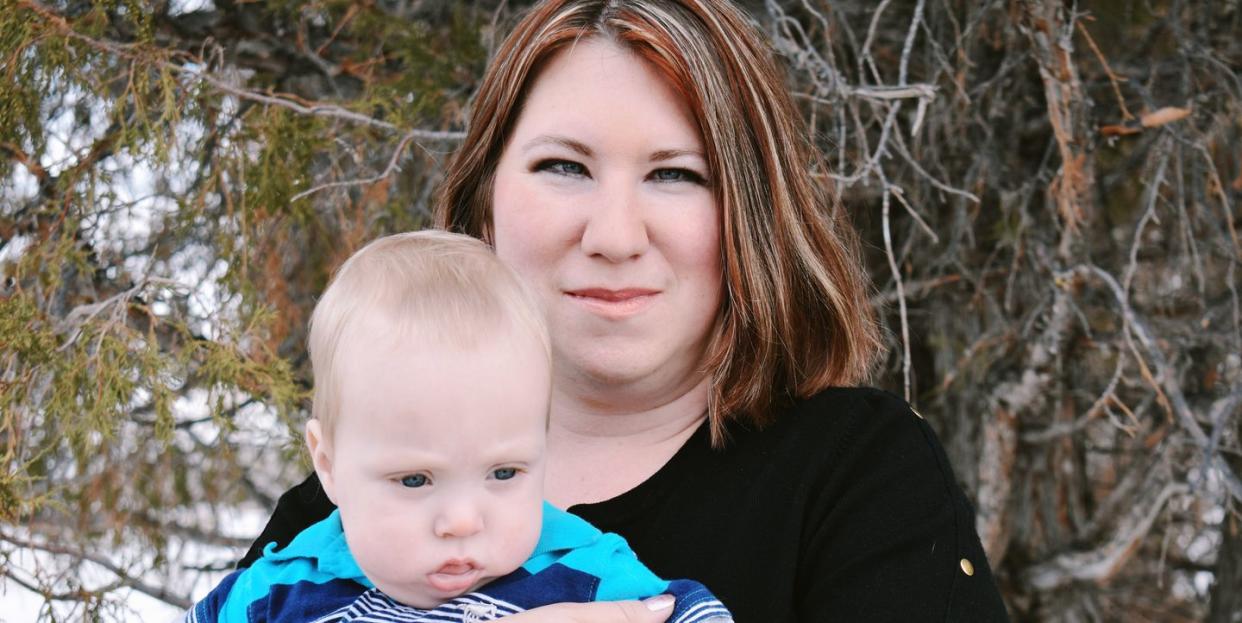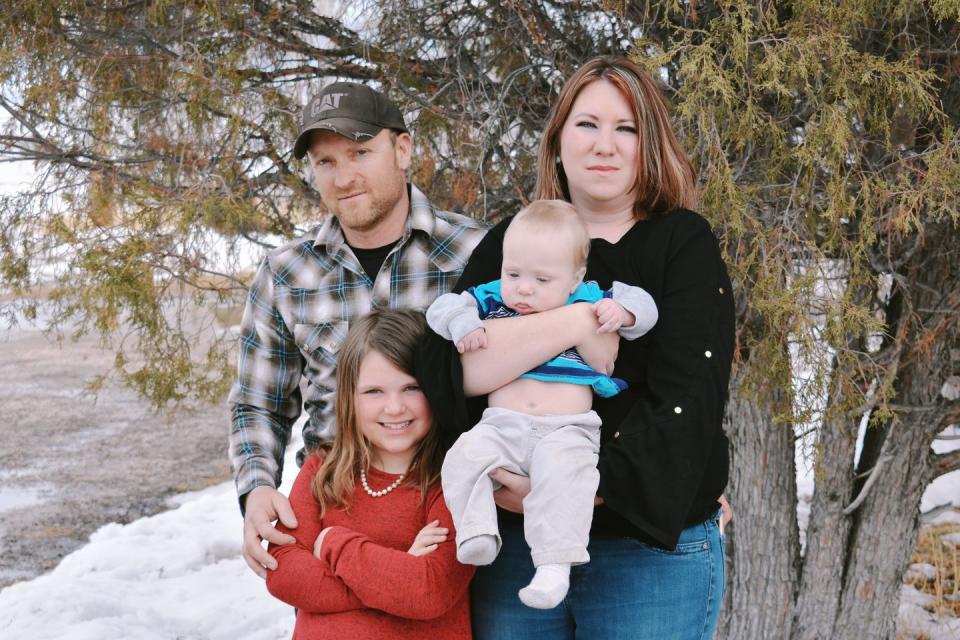My Husband Thought I Was Having a Heart Attack. It Was This Common Postpartum Problem Instead.

The first attack came in the middle of dinner prep.
Pain nearly bowled me over while I was setting the table. I had a burning sensation in my chest, and my shoulders, neck, and rib cage felt like they were being tightened by an invisible corset. I couldn’t bend at the waist. I couldn’t breathe.
My husband, convinced I was having a heart attack, shoved aspirin at me and begged me to go to the emergency room. But 30 minutes later, the awful pain (easily the worst I'd felt since labor) was gone.
I was two months postpartum. My infant son, Bryson, and I had spent most of the summer recovering from premature birth complications. I had a recently adopted daughter, a wildland firefighter spouse who could be called out at any moment, and two foster children. When I wasn’t parenting, I was managing the family business. I didn’t have time to be sick.
Though my pain had gone away, I slowly began to notice other symptoms. The eggs my daughter collected from our backyard chickens made me violently ill (this had never happened before). Coffee, one of the great loves of my life, didn’t sit so well, either. And the small, tight knot that had occupied the right side of my ribs ever since giving birth had begun throbbing dully.
Weeks later, at the end of a family day trip, the pain struck again. One minute I was fine and the next I was sitting bolt upright in the passenger’s seat, white-knuckling the lap belt, silently praying not to vomit as we raced home. Finally, I called my OB’s office.
“I think I need my gallbladder checked,” I said. After speaking to a few other moms, I'd grown suspicious that I had gallstones. This complication is frequently whispered about among moms but somehow is rarely acknowledged in pregnancy guidebooks. No sooner had I confided my pain to a few female relatives than the stories began flooding in that matched my symptoms.
The gallbladder is a small-ish, somewhat optional organ that stores bile produced by the liver. Bile, along with bile salts, is used to break down fats during the digestive process. When something upsets this basic balance, gallstones - including the type most commonly seen in pregnancy, known as lipid or cholesterol-laden stones - can form.
Unfortunately, pregnancy creates “the perfect storm of situations” for gallbladder trouble, says Christopher Robinson, M.D., of the Society for Maternal-Fetal Medicine. Hormonal and weight changes associated with pregnancy are more likely to cause gallstone problems.
In general, gallstones are pretty common, and most of the time, they go unnoticed. "Think of it like a working condition that is out there in your life, every day," Dr. Robinsons says. "It's not that pregnancy causes it, but it probably uncovers it.”
Pregnancy slows down the entire digestive system, contributing to sludge buildup in the gallbladder, Robinson notes. Estrogen and progesterone, both key pregnancy hormones, impact biliary secretions. And pregnancy also changes the way your body deals with fats. “In supporting the baby, the fat content in your blood actually increases very dramatically,” Robinson said. Even if you consume less fat, your body will continue working to send fat to the fetus.

Expecting mothers in their twenties and thirties have about a 6.5% chance of developing stones, an incidence that increases to nearly 12% by the time they hit their forties. Genetics, obesity, and previous pregnancies all up a mother’s risk of gallstones. Surprisingly, so do postpartum weight loss and breastfeeding, both otherwise healthy behaviors, because these conditions both involve more fat moving through the body.
After revealing my gallstone issues to others, I quickly realized I wasn't alone. Dorie Turner Nolt, 39, a consultant in Washington, D.C., had a “textbook” pregnancy until it was time to deliver and she wound up with multiple complications (an emergency caesarian section, a severe infection, and two more surgeries). A week after returning home from her last surgery, she woke up to a gallbladder attack.
Because she was still healing, another operation to remove her gallbladder would be dangerous so her doctor suggested she restrict her diet to help ease her symptoms. “For 10 months, I ate as little fat, sugar, and carbs as possible," she says. "I took supplements. I did gallstone cleanses to try and break up the stones. I drank apple cider vinegar daily, which was supposed to help with inflammation. Despite all of that, I still had attacks every few weeks that were absolutely miserable. Severe pain, vomiting, and exhaustion.” She finally had her gallbladder removed last spring, via an existing surgical scar.
Like Nolt, I was advised to try altering my diet first. Ultrasound analysis had confirmed my suspicions - I had gallstones, lots of them - yet because my symptoms were atypical, I was told that operating might not fix the problem. I acquiesced until last November, when my children witnessed the onset of a severe attack while I was driving. More than five hours of horrendous pain, nausea, and vomiting later, I was done. For me, gallstones had become a family safety issue, and I opted for a laparoscopic cholecystectomy - full gallbladder removal - shortly after Thanksgiving.
As troubling as postpartum complications like mine are, the risks associated with premature delivery mean expecting mothers dealing with severe gallstone pain face a doubly hard situation. Gallbladder disease in pregnancy contributes to premature birth, a February paper from the American College of Surgeons found. The study concluded that, in order to preserve mothers’ health and allow babies more time to develop, surgical intervention in pregnant women should be avoided as much as possible.
That’s what Ashley Cotterell, 27, had to think about when she headed for the emergency room at 33 weeks. Then pregnant with her fourth child, Cotterell, an event planner in Bozeman, Mont., said kidney stones had complicated all of her pregnancies, but this time, the pain was worse, and in a different location.
It turned out that Cotterell had developed both kidney and gallstones, and her pain level meant her gallbladder needed to come out. She prepared for an emergency induction by taking steroids to strengthen her unborn child’s lungs before delivering her son Mason at 34 weeks. While her baby was in another room being treated for low body temperature and jaundice, Cotterell underwent a cholecystectomy.
Despite the severity of our respective experiences, gallbladder complications never came up at any of our prenatal visits.
That may be because physicians don’t want patients to dismiss what could be life-threatening complications - such as preeclampsia or pancreatitis - as simply gallstone pain, which you can do very little about. “We want to know about these symptoms," Dr. Robinson says. "We don’t want a person writing it off as, ‘Well, it’s probably just my gallbladder.’”
As more women delay getting pregnant, however, their odds of gallstone problems increase. “Gallstones in our practice, in maternal-fetal medicine, are probably like every week,” he says. “They’re not that infrequent anymore.”
Nine months into new motherhood, the issue, for us, seems to be officially resolved. My postpartum figure now sports four small purple scars, quiet testament to what carrying my son put me through.
He’s been worth every single one of them.
('You Might Also Like',)

